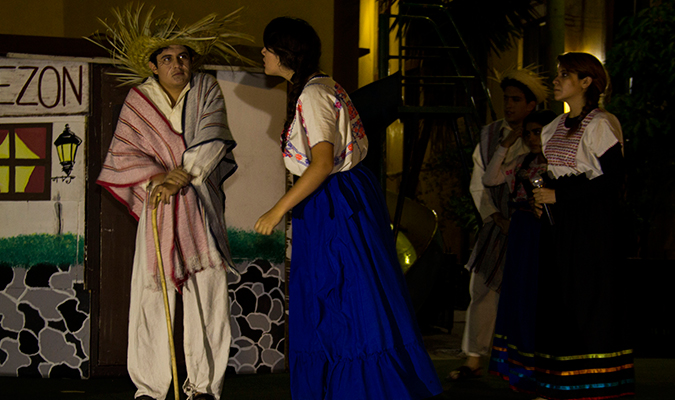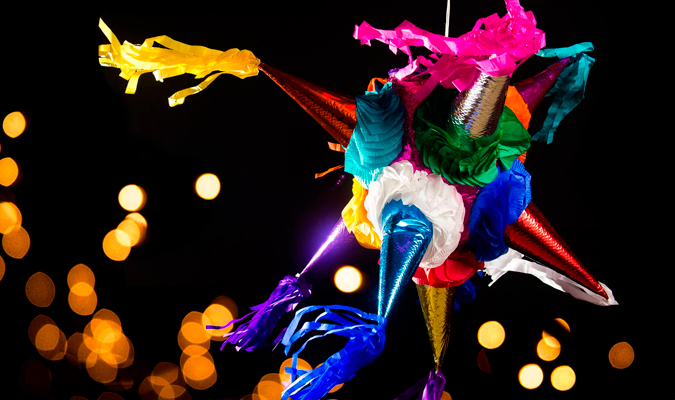For many Mexicans the word posadas evokes chilly nights surrounded by family and friends, singing, enjoying a warm meal and spreading holiday cheer all around. If you have never been lucky enough to be invited to one of these celebrations, read on to find out what makes these holiday fiestas so endearing to the people of Mexico.
What are posadas?
The word posada means inn or lodging, and traditionally posadas are a celebration of the Christmas story. They take place on nine nights from December 16th to the 24th and commemorate the Virgin Mary and St. Joseph’s search for a place to stay where Jesus could be born. Posadas in Mexico feature hot food and drinks, sweets, music, and piñatas.
Throughout Mexico, churches and communities still celebrate these festivities with their traditional, religious elements. Today almost any party held around Christmastime is called a posada. Schools often host posadas as end-of-the-year parties for students and teachers.

How did posadas originate?
Posadas in Mexico began as a way for the Spaniards to teach native people about Christmas. During the nine days leading up to Christmas Day, masses would include representations of Mary and Joseph. Following mass was a party where people were blindfolded before hitting a piñata with a stick, a representation of faith defeating temptation with the help of virtue. The fruits and sweets that poured out of the piñata represented the joys of union with God.
In time, posadas started to be held in neighborhoods and people’s homes, becoming a more familiar and tightly-knit occasion, as well as preparation for Christmas. At the beginning of a posada, people are divided in two groups, the ones “outside” representing Mary and Joseph, and the ones “inside” representing innkeepers. Then everyone sings the posada litany together, re-enacting Mary and Joseph’s search, going back and forth until they are finally “admitted” to an inn. After this tradition, the party proper starts. Posadas have spread to other countries—such as Guatemala, Ecuador, Colombia, and Venezuela; the celebrations vary by location.

Must-haves for a successful posada
- Piñatas. Although they have mostly lost their original religious meaning, piñatas remain an essential part of las posadas. They are commonly filled with candy. In more old-fashioned celebrations you’ll find them filled with small fruits, cookies, and peanuts.
- Aguinaldo or Bolo. These are little candy bags that hosts hand out to the guests at the end of the posada.
- Ponche Navideño (Mexican Christmas Fruit Punch). A hot, flavorful drink that for many is synonymous with the holidays. Its ingredients vary from state to state, but it is traditionally prepared with tejocote (Mexican hawthorn), sugarcane, tamarind, apple, pear, guava, and cinnamon sticks. Some hosts will also offer their adult guests ponche “con piquete,” punch with “a sting” of alcohol, usually tequila or rum.
- Tamales. These warm treats are made of steamed corn dough filled with meats, cheeses, and vegetables. They date from pre-Columbian times. You can find tamales throughout Mexico year-round, but they’re especially popular during the holiday season.
- Singing. The posada litany is essential. Many people also sing Christmas carols, and during modern posadas, people break out a karaoke machine and sing into the night.
The posada litany
| Spanish |
English |
Afuera:
En el nombre del cielo os pido posada pues no puede andar mi esposa amada. |
Outside:
In the name of Heaven I beg you for lodging, for she cannot walk, my beloved wife. |
Adentro:
Aquí no es mesón, sigan adelante, yo no debo abrir, no sea algún tunante. |
Inside:
This is not an inn, so keep going, I cannot open, you may be a rogue. |
Afuera:
No seas inhumano, tennos caridad, que el Dios de los cielos te lo premiará. |
Outside:
Don’t be inhuman; have mercy on us. The God of the heavens will reward you for it. |
Adentro:
Ya se pueden ir y no molestar porque si me enfado os voy a apalear |
Inside:
You can go on now and don’t bother us, because if I become annoyed I’ll give you a trashing. |
Afuera:
Venimos rendidos desde Nazaret, yo soy carpintero de nombre José. |
Outside:
We are worn out coming from Nazareth. I am a carpenter, Joseph by name. |
Adentro:
No me importa el nombre, déjenme dormir, pues que yo les digo que no hemos de abrir. |
Inside:
I don’t care about your name: Let me sleep, because I already told you we shall not open up. |
Afuera:
Posada te pide, amado casero, por sólo una noche la Reina del Cielo. |
Outside:
I’m asking you for lodging dear man of the house, just for one night for the Queen of Heaven. |
Adentro:
Pues si es una reina quien lo solicita, ¿cómo es que de noche anda tan solita? |
Inside:
Well, if it’s a queen who solicits it, why is it at night that she travels so alone? |
Afuera:
Mi esposa es María, es Reina del Cielo y madre va a ser del Divino Verbo. |
Outside:
My wife is Mary, she’s the Queen of Heaven and she’s going to be the mother of the Divine Word. |
Adentro:
¿Eres tú José? ¿Tu esposa es María? Entren, peregrinos, no los conocía. |
Inside:
Are you Joseph? Your wife is Mary? Enter pilgrims; I did not recognize you. |
Afuera:
Dios pague, señores, vuestra caridad, y que os colme el cielo de felicidad. |
Outside:
May God pay, gentle folks, your charity, and thus heaven heap happiness upon you. |
Adentro:
¡Dichosa la casa que alberga este día a la Virgen pura. La hermosa María! |
Inside:
Blessed is the house that shelters this day the pure Virgin, the beautiful Mary. |
Todos juntos:
Entren, Santos Peregrinos, reciban este rincón, que aunque es pobre la morada, os la doy de corazón. |
All together:
Enter, holy pilgrims, receive this corner, for though this dwelling is poor, I offer it with all my heart. |
Litany translation by Tony Rosado.
The holiday season is a wonderful time to visit Mexico and be a part of its rich traditions. Contact one of our expert travel planners and let us put together a custom trip for you and your family.
The post Posadas in Mexico, a Christmas Tradition appeared first on Journey Mexico.



